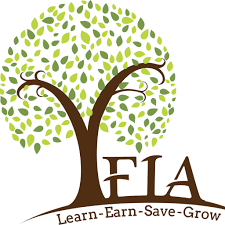We had the exciting opportunity to interview Amiko Foster of Youth Finance Institute of America (YFIA), a California-based nonprofit that provides personal finance education programs designed to teach finance life skills to youth in disadvantaged areas.
Since launching their program in 2015, YFIA’s entirely volunteer-based staff has been able to serve over 1200 youth to date. To build up a strong infrastructure to support growth, YFIA has decided to maintain remote work offices and transition from a volunteer-based staff to paid staff with part-time and full-time positions. To support YFIA in attracting and retaining top-talent, Common Impact connected the organization with a team of senior HR leaders at JPMorgan Chase to develop a competitive benefits package.
Amiko shared why this project was so meaningful to her organization and what the long-term impact will be:
1. Can you share the mission of Youth Finance Institute of America and what it means to you personally?
Our mission is to educate youth in low-income areas about personal finance basics. Typically adults in the areas that we serve don’t have credit cards, checking accounts or even a relationship with a bank and our goal is to help them be financially independent. We know personal finance isn’t always the most entertaining thing to talk about so we make it fun by integrating different games and prizes to engage kids at all levels.
YFIA is close to my heart. I’ve been on both the corporate side and the nonprofit side. On the corporate side, I come from a financial services background and spent the last 20 years in the field. I’ve worked in both affluent and low-income communities and I was struck when an adult would tell me they don’t know how credit works. The question I’ve always wanted to solve is how to get this information to the people and communities that need it the most. On the nonprofit side, my parents started their own organization that they ran for 10 years. I grew up with a passion for social change along with an understanding of the challenges nonprofits face.
2. Why was creating a benefits package a high-priority for your organization?
It was incredibly overwhelming to have support from the JPMorgan Chase volunteers – especially for an organization of our size. We have two fantastic board members and incredible paid interns, but right now, it is just me running the day-to-day operations. The reality is, I need help managing our operations in order to grow and need benefits in place in order to facilitate that growth.
The JPMorgan Chase team was so organized and invested in the process and our mission. Our team didn’t have experience with HR, but knew that we had to have benefits in place for future employees. The volunteers were incredibly supportive throughout the whole engagement. They helped me break out of my comfort zone and introduced concepts that weren’t even on my radar like in-kind gym memberships, shared workspaces, and bringing pets to work. They are all things that don’t cost much, but completely change the game. It allowed us to change our mindset to what is possible instead of saying we are too small to do this.
3. How has the deliverable from your project with JP Morgan Chase volunteers affected your staff growth plan?
Last year we helped over 800 students and now, we need a Program Manager to help us reach even more kids in 2019. This project is going to be the cornerstone for our hiring. The team went above and beyond by providing us an estimate of how much it will cost to onboard this new staff member and now I feel confident approaching funders. It is because of this project that I have a clear understanding of what I need and that is very powerful.
4. How will this project ultimately help your organization fulfill its mission?
Our goal is to help young people learn about personal finance. In order to do that, getting the right people in place is key to making the system work effectively. Having benefits in place will also allow us to be a competitive employer in the future.
California has no requirements for financial literacy curriculum. Right now, we want to focus on scaling what we do best – our financial education workshops – to fill that gap and make it a staple for our students.



